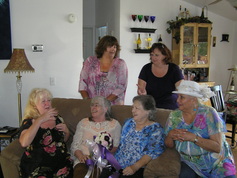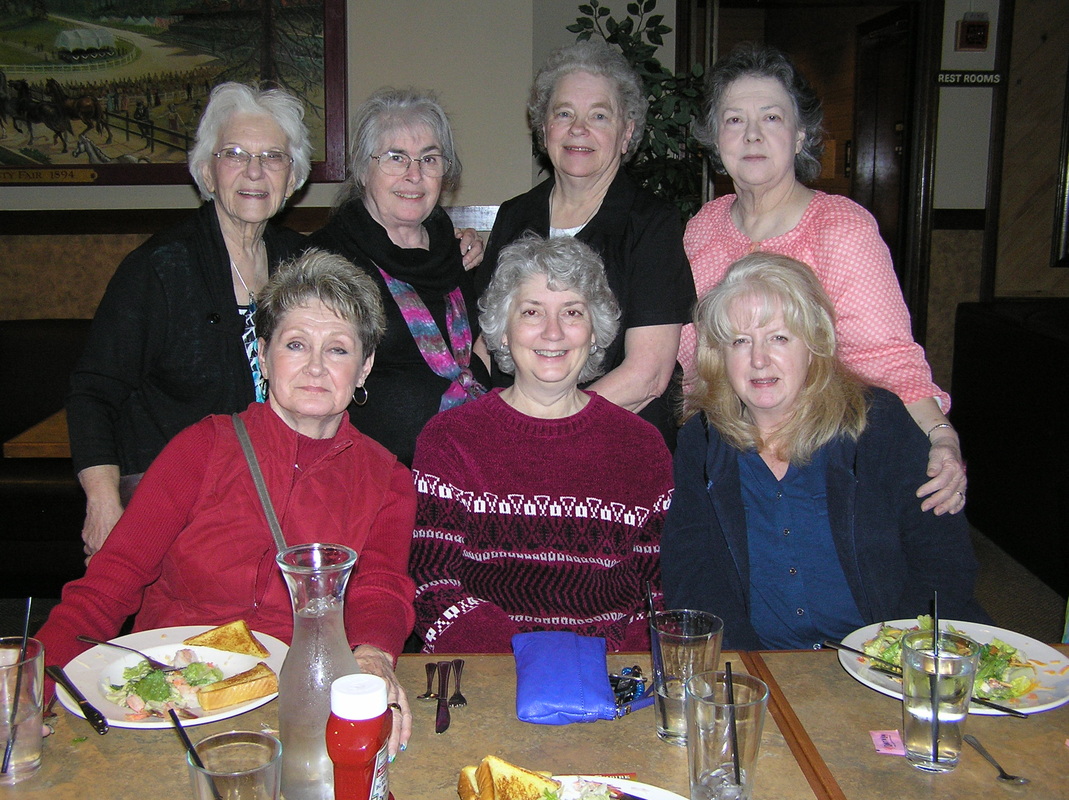 FAS* FRI crew partying again.
FAS* FRI crew partying again. I see in the news that some doctors and universities are finally getting around to replicating some of the FAS*FRI research, so I thought it would be a good idea to talk about who we were and what our research project discovered.
The research team consisted primarily of Jocie DeVries, Ann Waller M Ed, Vicki McKinney, Linda LaFever, Ken Dunning MS, Karen Reep MS, and Delinda McCann MA. Our advisory board contained Sterling Clarren MD, Ann Streisguth PhD. Ed Riley PhD, and Larry Byrd PhD. Over the years, many people came and went on the advisory board and on the research team. Those I’ve mentioned were the people who worked on the project over most of its life. Our primary funding was from the Washington State Department of Alcohol and Substance abuse. We had funding from other state agencies and from non-profits for small specific projects. The goal of the funding agencies was to provide support for families living with the carnage of this disability.
Over a period of fourteen years, we talked to over seven thousand families living with a member who had brain damage related to prenatal exposure to alcohol. We asked questions about their diagnosis, IQ, who the individual was living with, success in school, biggest issues, medications, and what strategies worked to keep the family functional.
One of the first glaring tidbits of information we gleaned is that not all people with FAS have a low IQ. Dr. Sterling Clarren said that the highest IQ for someone with FAS they found at the University of Washington clinic was 120. We had several youth with IQ’s in the near-gifted range who were diagnosed with full Fetal Alcohol Syndrome. We had many more individuals who had IQs in the normal range. Our sample of seven thousand eventually developed a somewhat bell shaped curve with a slight skew toward the lower IQ and cutting off at 120. By far the largest percentage of our population had IQs in the normal range.
Despite the huge variation in intelligence levels, all our population had common behavioral characteristics. Thus we set out to document what made our children with FAS behave the same despite their obvious differences in intelligence. Dr. Ed Riley and Dr. Ann Streisguth helped us understand the commonalities in behavior through their research using MRI to discover a distinctive pattern of brain damage related to alcohol exposure. We were on the right track with our explorations.
Ann Streisguth’s research on all the characteristics associated with the disability gave us the parameters we needed to focus on the characteristics common to everybody who has the disability. Other researchers are currently replicating this work.
We quickly eliminated those items on Dr. Streisguth’s list that only sub-groups of individuals displayed in order find the Core Behavioral Characteristics of Fetal Alcohol Syndrome. Eventually, we were able to work with Dr. Glenna Andrews, a specialist in agenesis of the corpus callosum to develop the BeST, a screening tool for Fetal Alcohol System. Dr. Andrew’s screening tool has been standardized and is available to clinics and school districts. Other researchers are now replicating Dr. Andrews work is currently being replicated by other researchers.
Because we were able to follow some of our population for fourteen years and because we had individuals between the ages of 3 months and 40 years in the study, we were able to record the strategies that worked for each age group. We published these findings in FASTimes, a newsletter funded by the state Department of Alcohol and Substance abuse to help families have positive outcomes while living with the disability. Some of our work was published in Iceberg, a University of Washington publication.
The single biggest problem for our kids came from the public school system. Few schools understood how to teach someone with FAS. They still don’t. My daughter’s teachers wanted to use the same materials for her that were used with kids with Down Syndrome, which is about the polar opposite of FAS. Our research team ended up spending many volunteer hours in Individualized Education Plan meetings. Some parents chose to home-school and were much happier than those battling stubborn school districts.
Among the plethora of findings from such a large long-term study we had many tidbits of interesting data. Most of the people with FAS were living in foster, adoptive or kinship homes. We did have a small, but stable group of birth families in our study. Linda LaFever was a master at working with birth families. We found a sub-group with digestive disorders. We didn’t come across a medication that worked for everybody. We found multiple generations from grandmother to mother to baby all with FAS.
The multiple generation issue was so prominent that we developed the objective for our population of stopping FAS with this generation. Among those we’ve followed, we were successful in preventing FAS in the next generation.
Obviously, considering the size and length of the study, we have much more information than can be covered here. I do look forward to seeing the university research community replicate our work.
My last thought is that we never found a safe level of alcohol consumption during pregnancy. The rule remains: Women of childbearing years who consume alcohol must be on a reliable form of birth control.
Top Photo: Seated Vicki McKinney, Delinda McCann, Jocie DeVries, Linda LaFever. Back Row: Dot Workman, Susan Bradley
For more information including copies of the FASTimes and the BeST screening tool visit http://www.fetalalcoholsyndrome.org/index.php


 RSS Feed
RSS Feed